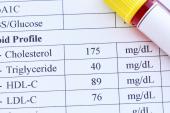No Safety Concerns Seen With Inclisiran in Large ORION Analysis
While there was less MACE with inclisiran, only future outcome trials will determine the drug’s ability to reduce CVD events.

Prolonged exposure to inclisiran (Leqvio; Novartis), the small-interfering RNA therapy (siRNA) that lowers LDL-cholesterol levels, is safe and well tolerated in a wide group of patients with hypercholesterolemia, according to results from a constellation of clinical trials.
In a pooled analysis of seven ORION studies, the mean duration of exposure to inclisiran was 2.8 years in more than 3,500 patients, with a small number treated beyond 5 years, but treatment-emergent adverse events (TEAEs), including serious events, occurred at similar rates when compared with placebo. Important kidney and liver TEAEs also were no different between inclisiran and placebo, report investigators.
R. Scott Wright, MD (Mayo Clinic, Rochester, MN), who led the new study, now published in the Journal of the American College of Cardiology, said that it represents the largest global experience with an siRNA therapy for any disease state.
“We have not seen any serious side effects to date, or even before the analysis, but we felt we owed due diligence to look at muscle, liver, kidney, new-onset diabetes, as well as any impact on major adverse cardiovascular events,” Wright told TCTMD. “You would also like to know if inclisiran worsened cardiovascular events or reduced them, but the signal suggests it’s going in the right direction.”
You would also like to know if inclisiran worsened cardiovascular events or reduced them, but the signal suggests it’s going in the right direction. R. Scott Wright
Wright stressed that neither this pooled look nor any of the individual trials were designed to determine if inclisiran reduces the risk of major cardiovascular outcomes, but the signs are encouraging. “Looking at the data, we feel very reassured about the safety signals as well as the design of the three large outcome trials—ORION-4, VICTORION-2P and VICTORION-1P—to be able to answer those [outcome] questions,” he said.
Unlike the monoclonal antibodies, which selectively target PCSK9 receptors to prevent them from binding to LDL receptors, inclisiran inhibits the production of PCSK9 in the liver, which in turn reduces LDL cholesterol levels. Alirocumab (Praluent; Sanofi/Regeneron) and evolocumab (Repatha; Amgen), which are monoclonal antibodies, were shown to reduce the relative risk of major cardiovascular events by roughly 15% when compared with placebo in the respective ODYSSEY-Outcomes and FOURIER studies.
The ORION-4 trial, which is being led by the University of Oxford in collaboration with the TIMI research group, will include 15,000 patients with atherosclerotic cardiovascular disease randomized to placebo or inclisiran and is expected to be completed in 2026. Results of the VICTORION-2P/1P studies, which each include approximately 15,000 patients with established cardiovascular disease or high-risk primary-prevention patients, respectively, are expected in 2027 and 2029.
Pooling ORION Trials
For the new study, patient-level data were pooled from seven trials: ORION 1, 3, 5, 8, 9, 10, and 11. These studies all used the recommended 300-mg dose of inclisiran administered on day 1, day 90, and then every 6 months in a wide range of patients with elevated LDL-cholesterol levels, the vast majority of whom had documented atherosclerotic cardiovascular disease (84%). In total, 3,576 patients were treated with inclisiran and 1,968 with placebo (mean age 64 years; 33% female in both groups). For those who received inclisiran, 72.2% were treated for more than 2 but less than 4 years. Additionally, 8.6% were treated for more than 4 but less than 5 years and 2.1% for more than 5 years.
During the first 1.5 years of follow-up, TEAEs and treatment-emergent serious adverse events (TESAEs) occurred at comparable rate in the inclisiran- and placebo-treated patients. Beyond 1.5 years, which included follow-up only for the inclisiran-treated patients, TEAEs and TESAEs leading to drug discontinuation “maintained similar trajectories” that suggest there was no change in the risk profile with longer exposure. Inclisiran treatment was associated with a higher risk of nonserious injection-site reactions.
The most common TEAE leading to drug discontinuation was neoplasm (1.0% for inclisiran and 0.5% for placebo), but there was no difference in hepatic-, muscle-, and kidney-related events between the two groups up to 1.5 years. Beyond this time point, the accrual of these TEAEs maintained a similar trajectory. There was also no sign of excess incident diabetes with inclisiran. Elevations in alanine aminotransferase were infrequent and similar between the two treatment groups when corrected for exposure. Elevations in creatine kinase and creatinine were also uncommon.
For the analysis, major adverse cardiovascular events were tracked as TEAEs, which occurred in 10.2% of patients treated with inclisiran versus 8.9% of patients treated with placebo. After adjusting for exposure to treatment, the incidence of MACE (cardiovascular death, cardiac arrest, nonfatal MI, and nonfatal stroke) was numerically lower with inclisiran than with placebo (3.79 vs 6.75 per 100 patient-years).
Treatment-induced antidrug antibodies were uncommon (4.6%) among those who received inclisiran and were mostly transient (3.2%).
‘Robust’ LDL Lowering With Inclisiran
To TCTMD, Wright said he uses inclisiran, which was approved in 2021 by the US Food and Drug Administration to lower LDL-cholesterol levels, in patients who are unable to tolerate a statin, those with heterozygous familial hypercholesterolemia, and individuals who need an additional lipid-lowering to get their LDL levels down further.
“And surprisingly, it’s a lot of people who need it,” he said.
Leandro Slipczuk, MD, PhD (Montefiore Healthcare Network/Albert Einstein College of Medicine, Bronx, NY), who wasn’t involved in the new study, was also reassured by the safety data, noting that they’ve been using inclisiran in select patients in line with the FDA approval.
“There’s no outcomes data yet, but I do use it,” said Slipczuk. While the PCSK9 inhibitors are generally preferred because these agents have proven cardiovascular benefits, and get a slightly larger reduction in LDL cholesterol levels (60% with the monoclonal antibodies versus 50% with inclisiran), he said he’ll use inclisiran in patients who can’t have injections every 2 weeks or those not compliant with that treatment.
“The thing that is a little tricky is that it's administered a little bit different than other medications,” said Slipczuk. “It has to be administered at an infusion center or in the clinic. We have it in the infusion center here at Montefiore, and we also have it in the clinic for some patients. When they come to clinic, we have it ready for them and they come to see us every 6 months and they get the shots. Some patients prefer to just go on their own to the infusion center.”
Slipczuk said inclisiran is also preferred in patients who have advanced Parkinson’s disease who are unable to self-inject.
The cardiovascular outcomes’ trials will provide definitive evidence that lowering LDL cholesterol with the siRNA reduces clinical events, something Wright is optimistic will be achieved in the three studies given the pronounced reduction in LDL cholesterol with inclisiran.
“Across all therapeutic classes, robust LDL lowering seems to drive a reduced clinical event rate,” said Wright. “Even with bempedoic acid, which only reduced LDL by 15% to 20%, there was a 13% relative reduction [in cardiovascular events]. Inclisiran gives over two times that degree of [LDL] reduction, and I think we're seeing some signals of efficacy in the early data that suggest there’s a great probability the outcome trials will show a positive result. But to be totally transparent, as an investigator you always remain at equipoise. Even though you expect a positive outcome, you are always looking for safety and other signals to watch.”
Likewise, Slipczuk said the data provides a signal that cardiovascular events are moving in the right direction with inclisiran. “Obviously, this is not randomized, and it should not be used for conclusions, but it's at least a nice a hint of what we're hoping to see in the main trials,” he said.
As a caveat, Slipczuk pointed out that more than 92% of inclisiran-treated patients were white in the ORION trials and two-thirds were male. As the outcomes trials move forward, ensuring a diverse patient population will be important, he said.
In an editorial, Christie Ballantyne, MD, and Abdul Mannan Khan Minhas, MD (both from Baylor College of Medicine, Houston, TX), along with Carl Orringer, MD (NCH Rooney Heart Institute, Naples, FL), write that long-term surveillance of inclisiran is important because it’s a first-in-class agent with a prolonged duration of action. They point out that new-onset diabetes was not a recognized side effect of statins until the drugs were used for decades.
“An informed clinician-patient discussion about the initiation of inclisiran should include a disclaimer of uncertainty about cardiovascular outcomes and shorter follow-up for adverse effects as compared with the PCSK9 monoclonal antibodies,” write the editorialists. “Additionally, treatment decisions may be affected by insurance coverage, which for PCSK9 monoclonal antibodies is via pharmacy benefits, and for inclisiran is through medical benefits.”
Michael O’Riordan is the Managing Editor for TCTMD. He completed his undergraduate degrees at Queen’s University in Kingston, ON, and…
Read Full BioSources
RS Wright, Koenig W, Landmesser U, et al. Safety and tolerability of inclisiran for treatment of hypercholesterolemia in 7 clinical trials. J Am Coll Cardiol. 2023;Epub ahead of print.
Ballantyne CM, Minhas AMK, Orringer CE. Inclisiran: where are we on safety, efficacy, and clinical effectiveness of siRNA therapies for prevention? J Am Coll Cardiol. 2023; Epub ahead of print.
Disclosures
- Wright reports advisory board fees from Boehringer Ingelheim and prior fees from The Medicines Company.
- Ballantyne reports institutional grant/research support and consulting fees from Novartis.





Comments